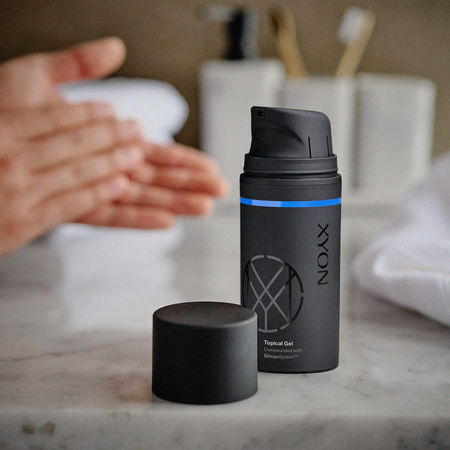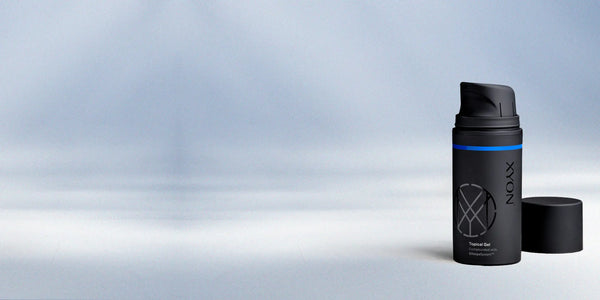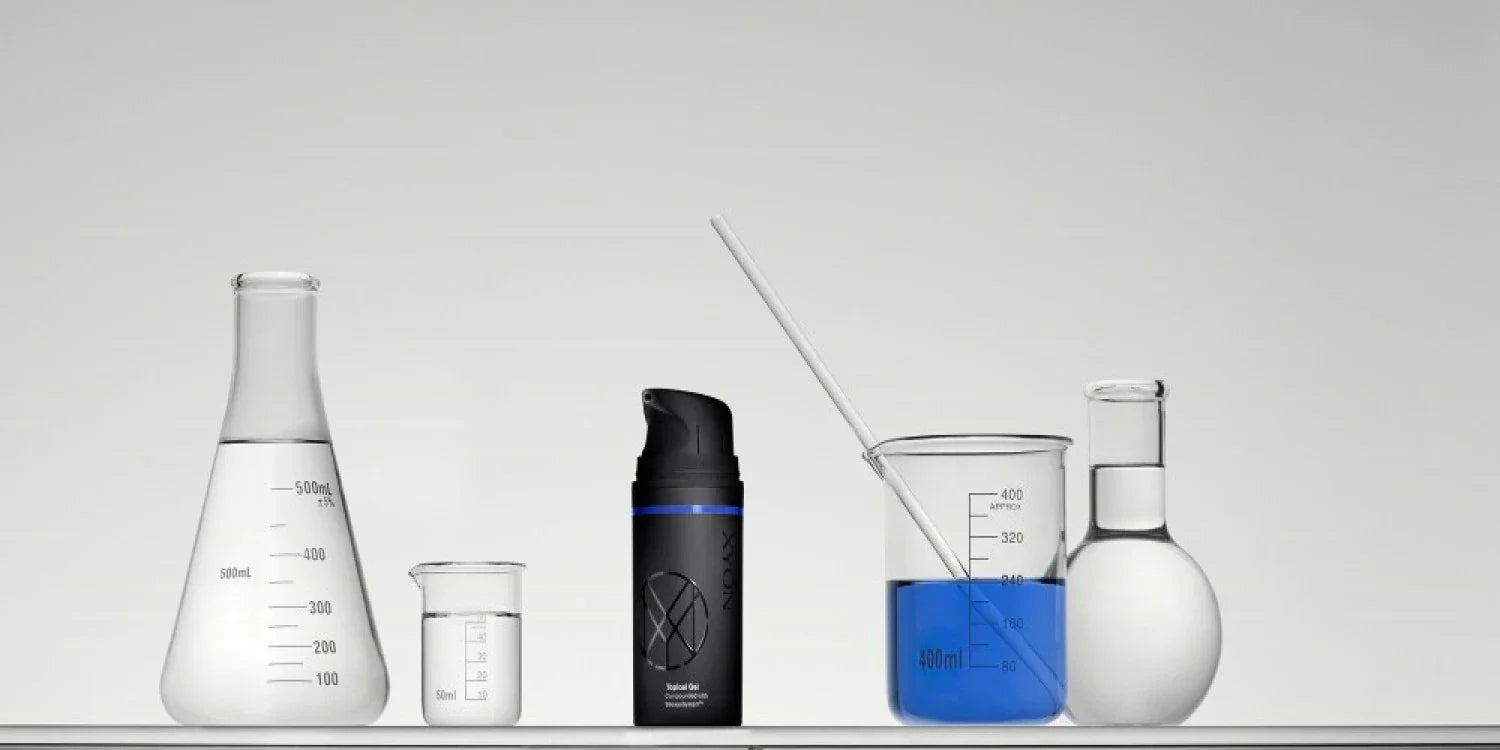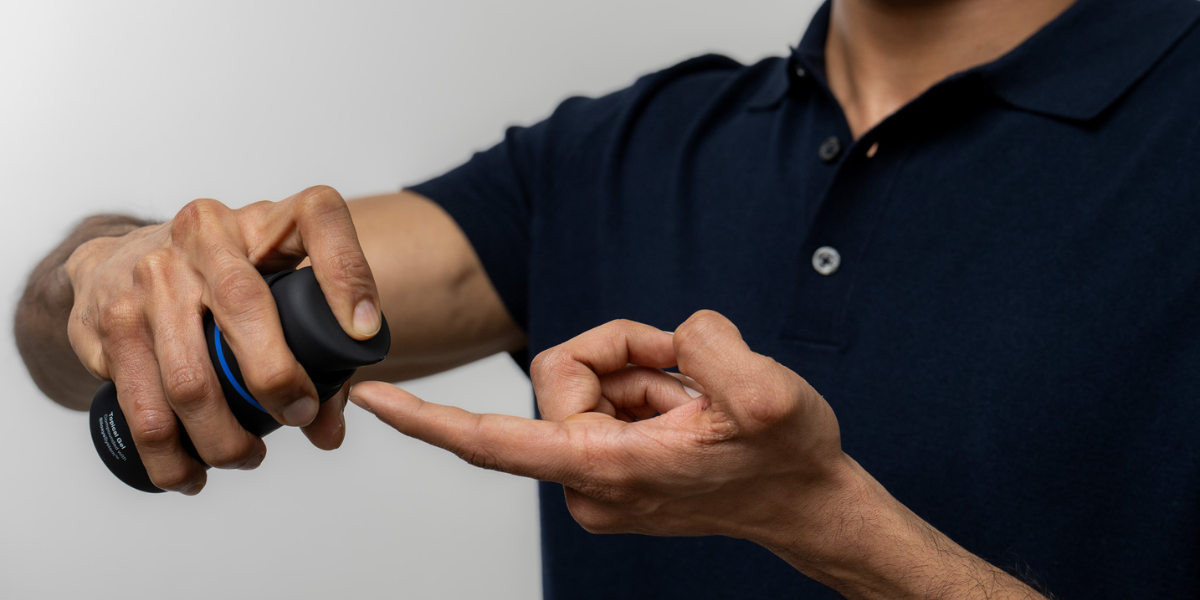Creatine is a substance commonly used as a pre-workout supplement because of its supposed ability to improve muscle endurance and energy. However, if you’ve ended up reading online threads about people losing their hair after starting creatine supplement, it might be enough to put you off. But how much evidence is there to support the theory that creatine actually causes hair loss?
We’re going to delve into this topic and bust any myths about hair loss associated with creatine.
What is creatine?
Creatine is a naturally occurring compound, primarily used by our muscles as a source of energy. Around half of the body’s supply of creatine is produced in the liver, kidneys and pancreas, with the other half coming from diet. Some examples of creatine-rich foods include red meat, seafood and milk. But as with most important nutrients, it can also be taken in supplement form, typically available as a powder that can be dissolved in water.
As a natural source of energy for the muscles, many people take creatine as a ‘pre-workout’ supplement, with the belief that it improves muscle mass and exercise performance.


Safe & Effective Hair Loss Prevention With XYON
Hair loss prevention & regrowth doesn't have to come with dangerous side effects. Get the same dosage as a finasteride pill in a safe topical solution
What does creatine do?
For our muscles to work, they rely on a compound called adenosine triphosphate (ATP) for energy. The breakdown of ATP releases energy that muscle cells use to contract. In fact, ATP is the main source of energy for muscle cells. So how does creatine come into play?
Well, ATP can’t be stored in large amounts in the muscles, so it needs to be replenished quickly during exercise for our muscles to keep going. Creatine is the key to this.
Creatine is stored in the skeletal muscles as a compound called phosphocreatine which is a combination of creatine and phosphoric acid. As ATP gets used and depleted, phosphocreatine helps to regenerate the supply of ATP quickly so that the muscles have a constant source of energy. This allows you to continue exercising for longer periods of time, therefore enhancing endurance and giving you more time to build up muscle mass. Countless research has proven that taking creatine supplements can improve exercise performance and increase fat free mass (Cooper et al, 2012).
As well as helping with muscle growth, creatine may also speed up muscle recovery after exercise (Wax et al, 2021) and increase anabolic hormones which contribute to growth and tissue repair.
Does creatine cause hair loss?
Since hair loss has been linked to other performance enhancing substances in the past, it’s reasonable to question whether creatine would cause similar effects. Creatine does not cause hair loss, at least not directly.
However, one study has raised questions about creatine’s potential impact on dihydrotestosterone (DHT) levels. This study looked at participants who took a loading dose of creatine for 7 days, followed by a ‘maintenance dose’ for 14 days (van de Merwe, 2009). Regular blood tests were performed to analyze serum DHT and testosterone levels throughout. After 7 days, DHT concentrations had increased by 56% and remained 40% above baseline measurements throughout the course of the study.
So how does this relate to hair loss?
DHT is largely implicated in the development of male pattern baldness. When DHT levels are high in individuals who are predisposed to losing their hair, DHT can cause hair follicles to shrink and produce weaker hair strands. Eventually, the follicles may be unable to produce any hair at all, leading to balding. So theoretically, if creatine raises the serum DHT levels, it could increase the risk of balding.
This doesn’t appear to be the case. In fact, the 2009 study didn’t assess whether any of the participants experienced hair loss, so it’s not possible to draw any conclusions from the findings. Upon further analysis, although the levels of DHT in the test group increased, they actually remained within normal physiological levels throughout the study. Additional research looking at the potential relationship between creatine levels and DHT production has found contrasting results, with other studies only finding small and insignificant increases in testosterone (and no changes in DHT) associated with creatine supplement use (Vatani et al, 2011) (Arazi et al, 2015).
To our knowledge, there is no other available data linking creatine to hair loss. XYON's CEO, Dr. Pimstone gave his expert opinion on this subject, stating:
"The jury is out, but there certainly isn't any strong evidence to suggest that creatine causes hair loss."
If you’re struggling with hair loss, it’s important to speak to a doctor. There are likely other factors at play and speaking to a hair loss specialist sooner rather than later will give you a head start with your hair regrowth journey.
What are the side effects of creatine?
While creatine doesn’t cause hair loss, there are other possible side effects associated with taking creatine supplements. These include:
- Muscle cramps
- Dizziness
- Diarrhea
- Liver dysfunction
- Kidney dysfunction
Researchers have also found temporary weight gain to be a possible side effect during the first few days of taking creatine, likely due to water retention (Hall & Trojian, 2013).
It’s important to bear in mind that creatine is a relatively new supplement, first gaining popularity for sports performance enhancement during the 1990’s (Bird, 2003). Since then, researchers have conducted many studies to evaluate its safety, but the true long-term effects (if there are any) remain somewhat unknown.
Having said that, The International Society of Sports Nutrition released a review which stated that high levels of creatine have been taken via supplements for years with no clinically significant or serious adverse events (Kreider et al, 2017). Though, they agree that data should be continually collected to keep monitoring for any potential long-term effects.
Why am I losing hair on creatine?
Whilst it’s true that creatine won’t directly cause hair loss, there’s a chance that it could be having an indirect impact on your hair health. Since creatine can increase your exercise endurance, it could be that you’re suddenly increasing the stress on your body through overexerting yourself or rapid weight loss paired with a calorie deficit and these changes can trigger a form of hair loss, called telogen effluvium. Telogen effluvium causes numerous hair follicles to suddenly shift into the resting phase of the hair growth cycle, leading to lots of hairs being shed all at once. Although a sudden increase in exercise intensity can cause changes in stress and male sex steroid hormone levels, these are typically short-lived, with no long-term effects on the risk for developing hair loss.
Is creatine a steroid?
If you’ve read our article on anabolic steroids, you’ll know that they have the potential to cause hair loss in some circumstances. Since creatine and steroids can both be used for performance enhancement in sports, many assume that they work in the same way and have the same effects. But they’re actually very different substances.
Creatine is not an anabolic steroid and it’s safer (and legal) to use in the context of performance enhancement. Anabolic steroids are actually a form of synthetic testosterone which can be added to the body to enhance muscle mass and strength by imitating the role of the natural hormone. Because anabolic steroids raise testosterone levels, they can also spike DHT levels and if someone happens to be genetically prone to balding, this can cause hair follicles to shrink. As previously mentioned, this is the primary mechanism behind male pattern baldness so anabolic steroids can cause hair loss. But the same does not apply to creatine.
What to do if you're losing your hair on creatine
If you are experiencing hair loss on creatine, the first thing you should do is speak to your doctor or a hair loss specialist. It’s unlikely that creatine is the sole reason for your hair loss, so simply stopping the creatine probably won’t solve the problem. Hair loss is a complex and often multifaceted condition, but identification and early intervention are key when it comes to treating the most common form of hair loss, pattern balding.
Fortunately, there’s a range of options available for treating hair loss. Many of these can be found at XYON and you can connect with one of our specialists today to learn about which medications are best suited to you.
Medicated options include drugs like finasteride. Finasteride has been proven to be highly effective at treating male pattern balding. By blocking the enzyme that converts testosterone into DHT, finasteride lowers DHT concentrations at the scalp in order to combat the primary mechanism behind pattern balding, which is follicle shrinkage (miniaturization). In oral form, finasteride is FDA and Health-Canada approved to treat hair loss in men, but it can be prescribed off-label as a topical formula for men and women suffering from this type of hair loss. If you’re interested in learning more, head to our page on finasteride.
Minoxidil is an alternative medication which uses a different mechanism of action to treat hair loss. It improves the supply of oxygen and key nutrients to the hair follicles by widening blood vessels, which supports healthy hair growth. Minoxidil is approved for hair loss in a topical format, but it can also be prescribed off-label following a consultation with a doctor as a low-dose tablet or compounded capsules.
The bottom-line on creatine and hair loss
Creatine is a naturally occurring compound which is most useful for the muscles, making it a popular pre-workout supplement. Proven to enhance exercise performance and aid in increasing muscle mass, creatine is often used in a similar manner to steroids, but without the same risks and drawbacks. Whilst one study has indicated that creatine can raise DHT levels, researchers have not been able to replicate these findings and there haven’t been any definitive links between hair loss and creatine.
If you’re suffering from hair loss while taking creatine, we recommend consulting your doctor to get assessed and to establish an appropriate treatment plan.
References
Arazi, H., Rahmaninia, F., Hosseini, K., Asadi, A. (2015). Effects of short-term creatine supplementation and resistance exercises on resting hormonal and cardiovascular responses. Science & Sports, 30(2), 105-109. https://doi.org/10.1016/j.scispo.2014.03.006
Bird, S.P. (2003). Creatine supplementation and exercise performance: A brief review. Journal of Sports Science & Medicine, 2(4), 123-132. https://pubmed.ncbi.nlm.nih.gov/24688272
Cooper, R., Naclerio, F., Allgrove, J., Jimenez, A. (2012). Creatine supplementation with specific view to exercise/sports performance: an update. Journal of the International Society of Sports Nutrition, 9(33). 10.1186/1550-2783-9-33
Hall, M., Trojain, T.H. (2013). Creatine supplementation. Current Sports Medicine Reports, 12(4), 240-244. https://doi.org/10.1249/jsr.0b013e31829cdff2
Kreider, R.B., Kalman, D.S., Antionio, J., Ziegenfuss, T.N., Wildman, R., Collins, R., Candow, D.G., Kleiner, S.M., Almada, A.L., Lopez, H.L. (2017).International Society of Sports Nutrition postion stand: safety and efficacy of creatine supplementation in exercise, sport and medicine. Journal of the International Society of Sports Nutrition, 14. https://doi.org/10.1186%2Fs12970-017-0173-z
Van de Merwe, J., Brooks, N.E., Myburgh, K.H. (2009). Three weeks of creatine monohydrate supplementation affects dihydrotestosterone to testosterone ratio in college-aged rugby players. Clinical Journal of Sports Medicine, 19(5), 399-404. 10.1097/JSM.0b013e3181b8b52f
Vatani, D.S., Faraji, H., Soori, R., Mogharnasi, M. (2011). The effects of creatine supplementation on performance and hormonal response in amateur swimmers. Science & Sports, 26(5), 272-277. https://doi.org/10.1016/j.scispo.2011.07.003
Wax, B., Kerksick, C.M., Jagim, A.R., Mayo, J.J., Lyons, B.C., Kreider, R.B. (2021). Creatine for exercise and sports performance with recovery considerations for healthy populations. Nutrients, 13(6). https://doi.org/10.3390%2Fnu13061915




